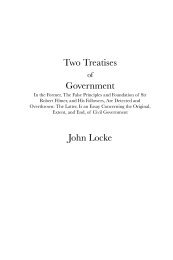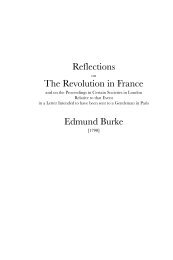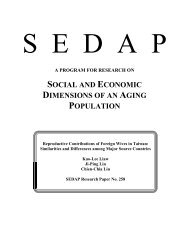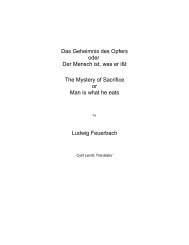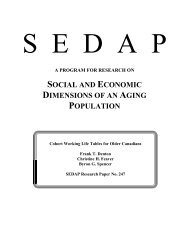CAPITALISTSbusiness. " At O~tend, Newport, and Dunkirk,where, and when, the Holland pinks come in, theredaily the Merchants, that be but Women (but notsuch Women as the Fishwives <strong>of</strong> Billingsgate ; for theseNetherland Women do lade many Waggons with freshFish daily, some for Bruges, and some for Brussels,etc., etc.) I have seen these Women-merchantsI say, have their Aprons full <strong>of</strong> nothing but EnglishJacobuses, to make all their Payment <strong>of</strong>."'Sir J. Child mentions " the Education <strong>of</strong> theirChildren as well Daughters as Sons ; all which, be they<strong>of</strong> never so great quality or estate, they always take careto bring up to write perfect good Hands, and tohave the full knowledge and use <strong>of</strong> Arithmetick andMerchant Accounts," as one <strong>of</strong> the advantages whichthe Dutch possess over the English ; " the wellunderstanding and practise where<strong>of</strong> doth strangelyinfuse into most that are the owners <strong>of</strong> that Quality,<strong>of</strong> either Sex, not only an Ability for Commerce <strong>of</strong> allkinds, but a strong aptitude, love and delight in it ;and in regard the <strong>women</strong> are as knowing therein asthe Men, it doth incourage their Husbands to hold onin their Trades to their dying days, knowing thecapacity <strong>of</strong> their Wives to get in their Estates, andcarry on their Trades after their Deaths : Whereas ifa Merchant in England arrive at any considerableEstate, he commonly with-draws his Estate from Trade,before he comes near the confines <strong>of</strong> Old Age ;reckoning that if God should call him out <strong>of</strong> the Worldwhile the main <strong>of</strong> his Estate is engaged abroad inTrade, he must lose one third <strong>of</strong> it, through the unexperienceand unaptness <strong>of</strong> his Wife to such Affairs,and so it usually falls out. Besides it hath been observedin the nature <strong>of</strong> Arithmetick, that like other parts<strong>of</strong> the Mathematicks, it doth not only improve theRational Faculties, but inclines those that are expertl England's Way, 1614. Harleian Misc., Vol. III., p. 383.CAPITALISTSin it to Thriftiness and good Husbandry, and preventsboth Husbands and Wives in some measure fromrunning out <strong>of</strong> their estates."'This account is confirmed by Howell who writes <strong>of</strong>the Dutch in 1622 that they are " well versed in allsorts <strong>of</strong> languages . . . Nor are the Men only experttherein but the Women and Maids also in their commonHostries ; & in Holland the Wives are so well versedin Bargaining, Cyphering & Writing, that in theAbsence <strong>of</strong> their Husbands in long sea voyages theybeat the Trade at home & their Words will pass inequal Credit. These Women are wonderfully sober,tho' their Husbands make commonly their Bargainsin Drink, & then are they more ca~telous."~This unnatural reversing <strong>of</strong> the positions <strong>of</strong> men and<strong>women</strong> was censured by the Spaniard Vives who wrote" In Hollande, <strong>women</strong> do exercise marchandise andthe men do geue themselues to quafting, the whichcustomes and maners I alowe not, for thei agre not fiithnature, ye which hath geuen unto man a noble, a high& a diligent minde to be busye and occupied abroade,to gayne & to bring home to their wiues & familiesto rule them and their children, . . . . and to yewoman nature hath geuen a feareful, a couetous & anhumble mind to be subject unto man, & to kepe ythe doeth gayne."'The contrast which had arisen between Dutch andEnglish customs in this respect was also noticed byWycherley, one <strong>of</strong> whose characters, Monsieur Paris,a Francophile fop, describes his tour in Holland in thefollowing terms : " I did visit, you must know, one <strong>of</strong>de Principal <strong>of</strong> de State General . . . and did find hisExcellence weighing Sope, jarnie ha, ha, ha, weighingsope, ma foy, for he was a wholesale Chandeleer ; and-l Child, Sir J., A N m Discourse <strong>of</strong>Trade, pp. 4-5. 1694,Howell, (Jas ), Familiar Letters, p. 103,a Vives, Ofice and Duties <strong>of</strong>a Husband, trans. by Thos. Papell.
38 CAPITALISTShis Lady was taking de Tale <strong>of</strong> Chandels wid her ownwiter Hands, ma foy ; and de young Lady, his ExcellenceDaughter, stringing Harring, jarnie . . . hisSon, (for he had but one) was making the Tour <strong>of</strong>France, etc. in a Coach and six."'The picture is obviously intended to throw ridiculeon the neighbouring state, <strong>of</strong> whose navy and commercial- - progressm England stood at that time in considerablefear.How rapidly the active, hardy <strong>life</strong> <strong>of</strong> the Elizabethan~entlewoman was being transformed into the0idleness and dependence whlch has characterisedthe lady <strong>of</strong> a later age may be judged by Mary Astell'scomment on " Ladies <strong>of</strong> Quality." She says, " They areplaced in a condition which makes that which is everyone'schief business to be their only employ. Theyhave nothing to do but to glorify God and to benefittheir neighbours."' After a study <strong>of</strong> the RestorationDrama it may be doubted whether the ladies<strong>of</strong> that period wished to employ their leisure) overthese praiseworthy objects. But had they the will,ignorance <strong>of</strong> <strong>life</strong> and inexperience in affairs arequalifications which perhaps would not have increasedthe effectiveness <strong>of</strong> their efforts in either direction.The pro<strong>of</strong> <strong>of</strong> the change which was taking placein the scope <strong>of</strong> upper class <strong>women</strong>'s interests does notrest only upon individual examples such as thosewhich have been quoted, though these instances havebeen selected for the most part on account <strong>of</strong> theirrepresentative character.It is quite clear that the occupation <strong>of</strong> ladies withtheir husband's affairs was accepted as a matter <strong>of</strong> coursethroughout the earlier part <strong>of</strong> the <strong>century</strong>, and it isonly after the Restoration that a change <strong>of</strong> fashion in thisrespect becomes evident. Pepys, whose milieu was* Wycherley, l@ Gentleman Dancing Master, p. 21.' Astell, (Mary), A Serious Proposal, p. 145, 1694.CAPITALISTStypical <strong>of</strong> the new social order, after a call upon Mr.Bland, commented with surprised pleasure on Mrs.Bland's interest in her husband's affairs. " Then to eata dish <strong>of</strong> anchovies," he says " and drink wine and syderand very merry, but above all things, pleased to hear Mrs.Bland talk like a merchant in her husband's businessvery well, and it seems she do understand it andperform a great deal."' The capacity <strong>of</strong> a womanto understand her husband's business seldom arousedcomment earlier in the <strong>century</strong>, and would havepassed unnoticed even by many <strong>of</strong> Pepys' contemporarieswho lived in a different set. Further evidence<strong>of</strong> <strong>women</strong>'s business capacity is found in the fact thatmen generally expected their wives would prove equalto the administration <strong>of</strong> their estates after their death,and thus the wife was habitually appointed executrix<strong>of</strong>ten even the sole executrix <strong>of</strong> wills. This customwas certainly declining in the latter part <strong>of</strong> the<strong>century</strong>. The winding up <strong>of</strong> a complicated estate andstill more the prosecution <strong>of</strong> an extensive business,could not have been successfully undertaken by personswho hitherto had led lives <strong>of</strong> idleness, unacquaintedwith the direction <strong>of</strong> affairs.That men did not at this time regard marriage asnecessarily involving the assumption <strong>of</strong> a seriouseconomic burden, but on the contrary, <strong>of</strong>ten consideredit to be a step which was likely to strengthen them in<strong>life</strong>'s battles, is also significant. This attitude waspartly due to the provision <strong>of</strong> a dot by fathers <strong>of</strong>brides, but there were other ways in which the wifecontributed to the support <strong>of</strong> her household. Thusin a wedding sermon woman is likened to a merchant'sship, for " She bringeth her food from far " . . .not meaning she is to be chosen for her dowry, "forthe worst wives may have the best portions, . . .a good wife tho' she bring nothing in with her, yet,Pepys, (Sam.) Diary, Vol. II., p. 113, Dec. 31, 1662.3 9
- Page 1 and 2: WORKING LIFE OF WOMENIN THESEVENTEE
- Page 3 and 4: PREFACEboth can be studied in the w
- Page 5 and 6: 2 INTRODUCTORY INTRODUCTORY 3is det
- Page 7 and 8: INTRODUCTORYThese circumstances hav
- Page 9 and 10: 10 INTRODUCTORY INTRODUCTORYthis pe
- Page 11 and 12: CAPITALISTSTerm includes aristocrac
- Page 13 and 14: CAPITALISTSA granddaughter of Olive
- Page 15 and 16: CAPITALISTSsuch as noe way entangle
- Page 17 and 18: 26 CAPITALISTS CAPITALISTS 27Wellin
- Page 19 and 20: 30 CAPITALISTS CAPITALISTS 3'years
- Page 21: CAPITALISTSboth, so that there coul
- Page 25 and 26: AGRICULTURE 43AGRICULTUREAgricultur
- Page 27 and 28: AGRICULTURE AGRICULTURE 47two Weeks
- Page 29 and 30: AGRICULTUREFitzherbert's descriptio
- Page 31 and 32: 54 AGRICULTUREamong the gentry. The
- Page 33 and 34: 5 8 AGRICULTURE AGRICULTURE 59was u
- Page 35 and 36: 62 AGRICULTURE AGRICULTURE 63" Spre
- Page 37 and 38: AGRICULTUREthe same work,' a marrie
- Page 39 and 40: AGRICULTUREThe Justices in the Nort
- Page 41 and 42: AGRICULTUREIn some places the labou
- Page 43 and 44: AGRICULTURELabourers naturally were
- Page 45 and 46: 82 AGRICULTURE AGRICULTUREdenyed a
- Page 47 and 48: AGRICULTUREpayne of xs a weeke and
- Page 49 and 50: AGRICULTUREThe conduct of the magis
- Page 51 and 52: 94 TEXTILES TEXTILESIt requires som
- Page 53 and 54: TEXTILESchildren were said to be em
- Page 55 and 56: TEXTILES TEXTILES 103respect obtain
- Page 57 and 58: TEXTILES TEXTILES'07people who had
- Page 59 and 60: I 10 TEXTILES TEXTILES I111693 to p
- Page 61 and 62: I 14 TEXTILES TEXTILES 115books,' b
- Page 63 and 64: 118 TEXTILES TEXTILES 119money in p
- Page 65 and 66: 122 TEXTILES TEXTILES 123clothing w
- Page 67 and 68: 126 TEXTILES TEXTILESclosely imitat
- Page 69 and 70: 1 30TEXTILESspinsters' maximum wage
- Page 71 and 72: TEXTILESa mownte in the yere t o jM
- Page 73 and 74:
'38 TEXTILES TEXTILESD. Silk, and G
- Page 75 and 76:
142TEXTILES TEXTILES '43end. And it
- Page 77 and 78:
TEXTILESbranches of the woollen ind
- Page 79 and 80:
CRAFTS AND TRADESCHAPTER V.--CRAFTS
- Page 81 and 82:
CRAFTS AND TRADES CRAFTS AND TRADES
- Page 83 and 84:
I 58CRAFTS AND TRADESwith the wife
- Page 85 and 86:
CRAFTS AND TRADES CRAFTS AND TRADES
- Page 87 and 88:
CRAFTS AND TRADES. . . . shall teac
- Page 89 and 90:
I 70 CRAFTS AND TRADES CRAFTS AND T
- Page 91 and 92:
CRAFTS AND TRADESone month the Mast
- Page 93 and 94:
178 CRAFTS AND TRADES CRAFTS AND TR
- Page 95 and 96:
182 CRAFTS AND TRADES CRAFTS AND TR
- Page 98 and 99:
I 88 CRAFTS AND TRADES CRAFTS AND T
- Page 100 and 101:
192 CRAFTS AND TRADESIn the unprote
- Page 102 and 103:
CRAFTS AND TRADESand eleven sisters
- Page 104 and 105:
200 CRAFTS AND TRADES CRAFTS AND TR
- Page 106 and 107:
CRAFTS AND TRADES CRAFTS AND TRADES
- Page 108 and 109:
CRAFTS AND TRADESBut if a woman be
- Page 110:
2 12 CRAFTS AND TRADES CRAFTS AND T
- Page 114 and 115:
CRAFTS AND TRADES CRAFTS AND TRADES
- Page 116 and 117:
CRAFTS AND TRADESalso defended as a
- Page 120 and 121:
CRAFTS AND TRADESfrom her fellow pa
- Page 122 and 123:
PROFESSIONS 237PROFESSIONSIntroduct
- Page 124 and 125:
24O PROFESSIONS PROFESSIONStheir Th
- Page 126 and 127:
244 PROFESSIONS PROFESSIONS 245the
- Page 128 and 129:
PROFESSIONS PROFESSIONS 249profanat
- Page 130 and 131:
252PROFESSIONSGiles Moore enters in
- Page 132 and 133:
PROFESSIONScribed as one who " dist
- Page 134 and 135:
PROFESSIONS PROFESSIONS 261first ma
- Page 136 and 137:
264 PROFESSIONSGarrett's leg shall
- Page 138 and 139:
268 PROFESSIONSwhere there are none
- Page 140 and 141:
PROFESSIONS PROFESSIONS 273the numb
- Page 142 and 143:
PROFESSIONSexaminations, before six
- Page 144 and 145:
PROFESSIONS PROFESSIONS 281death me
- Page 146 and 147:
284 PROFESSIONS PROFESSIONSof confi
- Page 148 and 149:
288 PROFESSIONSextent they were whe
- Page 150 and 151:
CONCLUSIONor in her other facilitie
- Page 152 and 153:
CONCLUSION CONCLUSION 297in women's
- Page 154 and 155:
CONCLUSIONlaw of Nature, inviolable
- Page 156 and 157:
CONCLUSIONwere specially deprecated
- Page 158 and 159:
308 CONCLUSIONof the State, and the
- Page 160 and 161:
312 AUTHORITIES AUTHORITIES 313Cost
- Page 162 and 163:
AUTHORITIESMartindale, Adam, The Li
- Page 164 and 165:
County.Buckingham ..Cardigan .. ..C
- Page 166 and 167:
INDEXINDEXFlax, 64, 146, 246, 291 ;
- Page 168:
INDEXsmants, women( 50,65,157 ; mam



